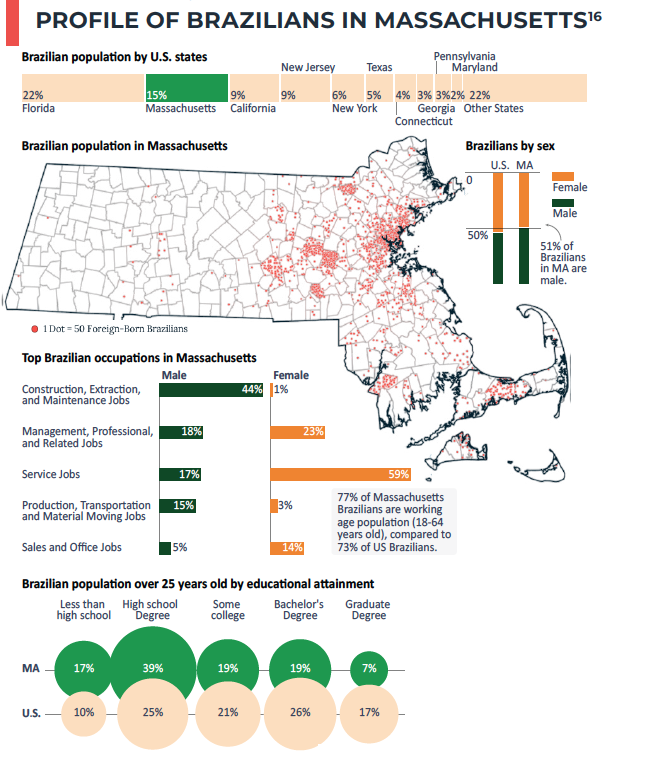
Mapping Scientific Diasporas – The Brazilian Case Study
This study leverages labor market data, name recognition, and analysis to map and understand scientific diasporas. A case study of the Brazilian scientific diaspora in the Greater Boston region illustrates the methodology developed by the Research Division of the City of Boston Planning Department in partnership with Claro Analytics and NamSor. The case study’s findings present Brazilians’ educational and professional characteristics in Boston’s scientific sectors. The case study’s methodology provides a scalable framework to analyze ethnic diasporas across the United States and globally.
The primary motivation for the study was to test a methodology designed to identify existing scientific diasporas from secondary data sets to provide a way for governments in sending and receiving countries to coordinate mutually leveraging diasporas’ knowledge and skills.
The Research Division is a division of the City of Boston’s Planning Department, which Mayor Wu established in 2024 to restore planning as a core function of city government. The Division compiles and analyzes current, historical, and comparative data on the City’s population and economy to produce quality research that informs policy.
Claro Analytics is a labor market company whose mission is to help organizations make more innovative, strategic talent decisions through actionable labor market data.
Claro currently has over 620 million profiles from across the globe parsed into different searchable categories such as skills, current employer, degree, location, etc.
NamSor is a Big data company that developed specialized data mining software that recognizes personal names’ linguistic or cultural origin in any alphabet or language to accurately classify personal names by gender, country of origin, or ethnicity.
NamSor uses a natural language processing (NLP) model, embedding a representation of a word as real-valued vectors that encode the world’s meaning
so that the words closer in the vector space are expected to be similar.
CLIKC NOS LINKS TO ACCESS THE REPORT AND PRESENTATION.
BIBLIOGRAFIA:
Carneiro, Ana Maria; Gimenez, Ana Maria Nunes; Consoni, Flávia; Andretta, Victor Fidencio; Granja, Cintia Denise; Balbachevsky, Elizabeth (2019). Diáspora Brasileira de Ciência, Tecnologia e Inovação. Universidade de Campinas, São Paulo.
Robertson, Susan L. (2008). ‘Bringing Diasporas to Market: Leveraging Talent (and Patriotism) for Nations’ Economies.’ Centre for Globalisation, Education and Societies. University of Bristol, UK.
Haas, Hein de (2006). Engaging Diasporas: How Governments and Development Agencies Can Support Diaspora Involvement in the Development of Origin Countries, International Migration Institute James Martin 21st Century School, University of Oxford, UK.
Kuznetsov, Yevgeny – Editor, (2006). Diaspora Networks and the International Migration of Skills: How Countries Can Draw on Their Talent Abroad, World Bank Institute. Washington, DC.
Kuznetsov, Yevgeny (2010). How Can Countries‘ Talent Abroad Help Transform Institutions at Home? Instruments and Policies of Diaspora Engagement, World Bank. Washington, DC.
Ferreira, Vinicius Kauê (2022). Do “brain drain” às redes científicas globais, Universidade do Estado do Rio de Janeiro. Rio de Janeiro. RJ.
Araújo, Galber Rodrigues e de Souza Lima, Melissa Caldeira Brant (2021). Mapeamento da Diáspora Brasileira de Ciência, Tecnologia e Inovação na Áustria, na
Eslováquia e na Eslovênia, Embaixada do Brasil em Viena, Áustria.
Vega-Martinez, Jonathan; Pache de Athayde, Maria M.; Torres-Ardila, Fabián; Granberry, Phillip (2025). Tienen Alas, Pero No Las Pueden Usar: Stories of Immigrants in Search of Work Credentials. Gastón Institute Publications, University of Massachusetts Boston, Boston, MA.
Porque os Brasileiros Voltam – O Retorno
O artigo “O sonho frustrado e o sonho realizado: as duas faces da migração para os EUA”, de Sueli Siqueira, apresenta quatro tipos de retorno. O primeiro é o “retorno temporário”, quando o imigrante define os Estados Unidos (ou outro país qualquer) como seu local de residência, juntamente à sua família assim como …
Remessas Sociais
As remessas são, em geral, entendidas somente como remessas monetárias. No entanto, elas podem também ter natureza social cultural. Peggy Levitt em seu artigo Social Remittances: Migration-driven Local-development Forms of Cultural Diffusion (1998) e subsequente livro The Transnational Villagers (2001), cunhou o termo “remessas sociais” (social remittances) para realçar o fato de que os imigrantes…
Remessas Monetárias
A globalização está acelerando a migração internacional. Impulsionada por uma série de fatores, tais como a crescente necessidade de mão de obra qualificada e não qualificada nos países desenvolvidos dado o baixo nível de fertilidade e o rápido envelhecimento da população; persistente pobreza…

